
Should I Get Battery Storage to go with My Solar Panels?
Investing in solar panels is a considerable step towards embracing sustainable energy and cutting down on your electricity bills. As you explore the idea of going solar, one question that may arise is whether you should also invest in a battery storage system to complement your solar panels. While battery storage can be an added investment, its benefits and drawbacks are worth considering.
What Does Battery Storage Do?
Solar battery storage units store excess energy generated by your solar panels for later use. Typically, your solar panels generate more electricity during the day than you consume. Without a storage unit, this excess energy goes back into the grid. In contrast, a battery stores this energy, allowing you to use it when your panels aren't generating electricity—like during the night or on cloudy days.
The Advantages of Battery Storage
Energy Independence
With a solar battery, you can store excess energy and use it when you need it, reducing your reliance on the grid. This gives you a level of energy independence that can be particularly beneficial during power outages.
Cost Savings
Many areas have variable electricity pricing based on demand, often referred to as "time-of-use" rates. Storing your solar energy allows you to use your stored electricity during peak hours, avoiding the high costs of grid electricity during those times.
Environmental Impact
By using your own clean, renewable energy more efficiently, you reduce your overall carbon footprint.
Grid Services
Some jurisdictions offer financial incentives for battery owners willing to contribute their stored power back to the grid during peak demand. This not only helps balance the grid but also provides an additional revenue stream for you.
The Drawbacks of Battery Storage
Initial Costs
The upfront cost of solar batteries can be substantial, though prices are continually falling. Depending on your energy needs, the investment may or may not pay off in the long term.
Maintenance
While solar panels require little to no maintenance, batteries have a shorter lifespan and may need to be replaced or serviced within 10 to 15 years.
Efficiency Loss
No battery is 100% efficient; you'll lose some energy in the process of storing and retrieving electricity, typically around 5-10%.
Space
Battery systems can take up considerable space, which might be a concern if you have a small property.
Factors to Consider
Energy Needs
If you have high energy requirements during the night or live in an area prone to power outages, a battery can be invaluable.
Financial Incentives
Look into any grants, tax credits, or financial incentives that may offset the cost of battery storage in your area.
Return on Investment
Estimate the long-term cost savings of battery storage, taking into account your energy consumption patterns, to determine whether it's a sound investment.
Conclusion
Installing a battery storage system along with your solar panels can offer you energy independence, potential cost savings, and a reduced carbon footprint. However, the upfront costs and potential maintenance are considerations to weigh carefully. Take stock of your individual energy needs, the financial landscape, and local incentives to make an informed decision.
